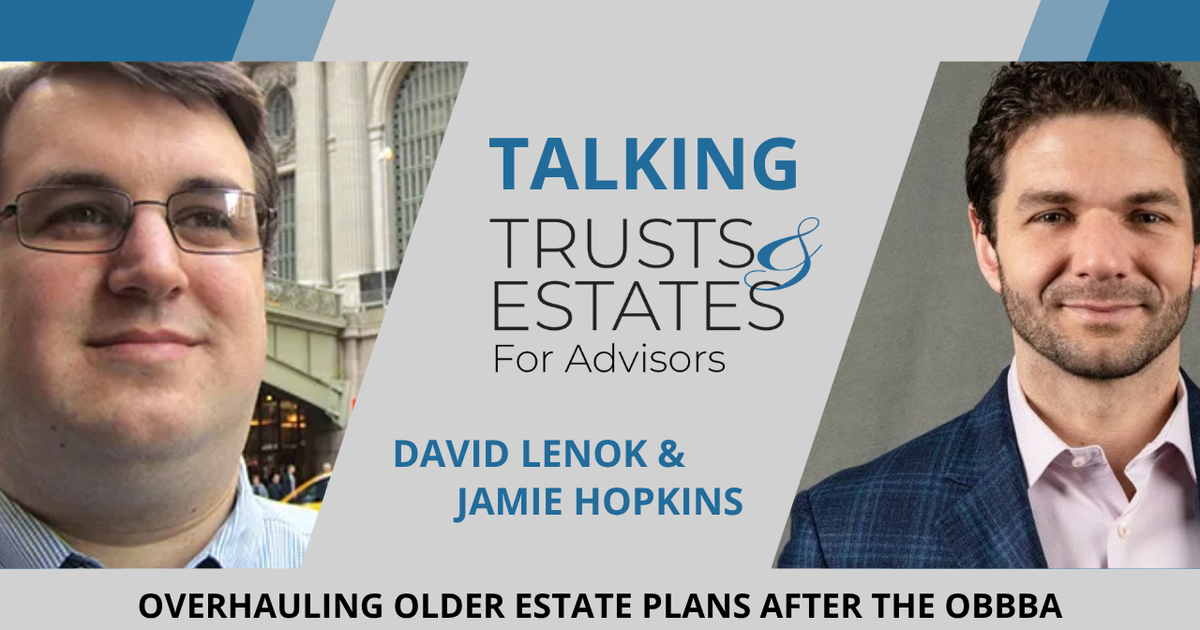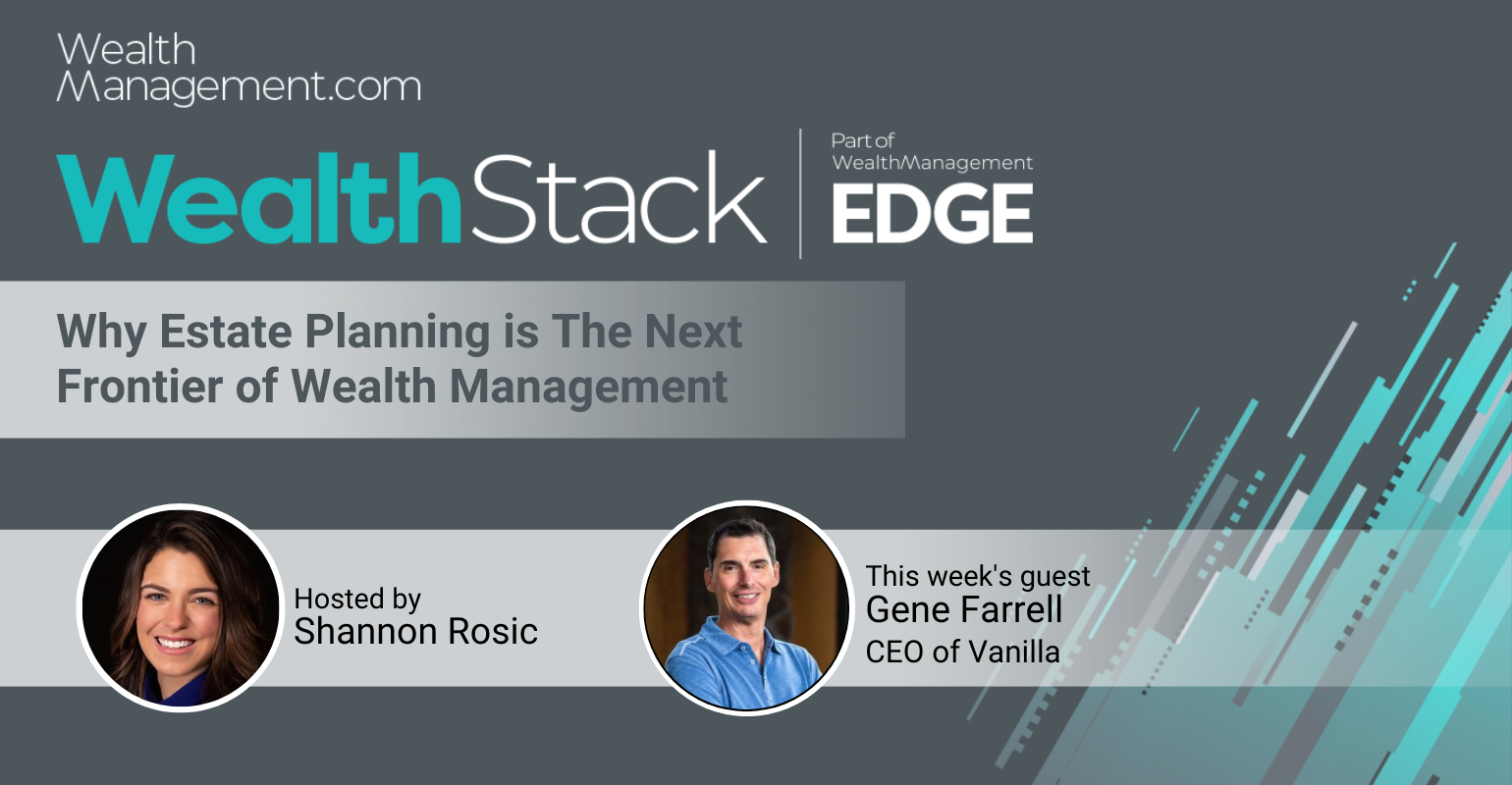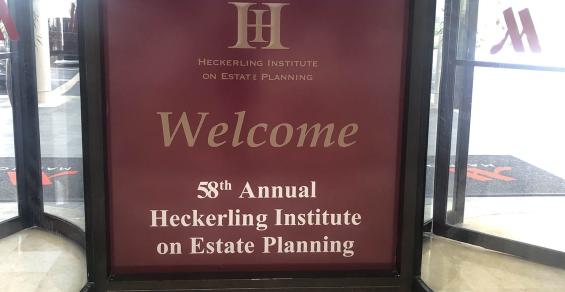Talking T&E for Advisors: Overhauling Older Estate Plans After the OBBBA

Welcome to Talking T&E for Advisors, where WealthManagement. Senior Wealth Planning Editor David Lenok and Jamie Hopkins, chief wealth officer at Bryn Mawr Trust, take seemingly complex estate planning issues and break them down for financial advisors.
In this video, they discuss the need to overhaul estate plans after the passage of the One Big Beautiful Bill Act:
What are the biggest changes coming to estate planning under the One Big Beautiful Bill Act?
Why might older estate plans—especially those using credit shelter trusts—no longer be effective?
How does this new law change how we think about “basis step-up” and capital gains planning?
What should families or advisors be doing now to prepare for these changes?
Looking ahead, what risks or uncertainties should people keep in mind with estate tax laws?
Read the full raw transcript below:
David Lenok Hello everyone. My name is David Lenok. I’m a senior editor at Wealth Management.com and Trusts & Estates, and I’m here with Jamie Hopkins, CEO of Bryn More Trust Advisors LLC, Chief Wealth Officer of Bryn Mare Trust. Thanks so much for joining us, Jamie.
Jamie Hopkins: Hey, thanks for having me on, David. Good to see you.
DL: So today we’re gonna discuss the need to overhaul estate plans after the OBBBA. I know the name has changed, but we’re still gonna go with the old fun one. Based on an article in the October issue of Trusts & Estates, the gist of that piece, written by Nicholas Khayumov and Jordan Linn is that this new law triggers a critical and often overlooked question for clients and advisors, namely, do older estate plans designed around lower exemption amounts still work to carry out your intentions?
However, before we jump directly into that discussion, let’s pull things back a little bit for a broader view.
DL: Jamie, what are the biggest changes coming to estate planning under the OBBBA, the One Big Beautiful Bill Act?
JH: Yeah, the One Big Beautiful Bill, you know, while you could argue it has a really big impact on estate planning, my view was it was kind of a smaller impact than some of the other versions we could have seen.
The big piece is moving up the federal estate and gift tax exemption again higher, up to $15 million per person, starting in 2026. Now again, every bill always says that’s like a permanent exemption change, but as we’ve seen, every bill seems to make a new one.
But, you know, I mean, there was talk about that going away completely. There were actually even some Republicans pushing for a lower gift and estate tax exemption amount because it can be a revenue generator, at least on paper, for the government too. So if you’re trying to manage the budget and all those things at once.
So, that was really the big one. Some of the other trust provisions that have been out there before about accumulated gains didn’t make its way into the bill. So I’d say it ended up being somewhat minor, although obviously when we’re talking about people’s money and millions of dollars, it’s not minor when it comes down to individual situations.
DL: So, let’s focus in a little bit. Why might older estate plans, especially those who are using credit shelter trusts, no longer be effective?
JH: Yeah, so one of the big questions, and you started off with this, is once these exemption amounts change, once laws change out there as it relates to estate planning, are these trusts and estate plans that we set up earlier under lower exemption amounts still as viable?
And one of the big themes across the entire article was: the step up in basis aspect of leaving assets at death versus getting them permanently outside of your estate earlier becomes more important as the exemption amount moves up, mostly because fewer and fewer people are impacted by estate taxes, so we don’t really have to scramble around to avoid them.
Now that being said, I said this a little bit earlier, my view, and I work with a trust company, is that for the last couple of years, very little amount of the trust work has been about avoiding the estate tax. It has really been about control.
So if your old estate plan was really about control, primarily, but then taking advantage of the tax rules as they were at the time, it’s probably still fine. Now, if your entire plan was around avoiding taxes, it is probably time to review it again. That could be adding a new trust, it could be decanting or changing your old trust. Some of that can be really hard depending on how it was set up, because if it was really an old kind of credit shelter or bypass trust that was fully irrevocable from you, that might just be set, but you might need additional things now on top of it to take advantage of these larger exemption amounts in 2026.
DL: So as you mentioned, as sort of fewer estates and as fewer trusts are worried about estate tax specifically, there still are these tools to use. So how does this new law change how we think about the basis step up itself and capital gains planning in general?
JH: Yeah, the main thing that you’ll see as this moves up is less people trying to irrevocably get rid of their assets via trusts. So it’s going to be more revocable trusts, more maybe irrevocable at the time of death, testamentary type trusts, but we’re OK with holding these things to our estate now, because we will get this step up in basis from assets that get left at death in our estate, not every asset, but most of them, get stepped up in basis tax treatment, versus when we gift to transfer assets across while we are alive, we get this kind of carryover of our existing basis.
So for a lot of business owners, they had a very small basis in their company, they grow tremendously, and that has to become a question now: Do you try to hold more of that to end of life versus transferring it at smaller chunks throughout your life to your heirs? That’s gonna be one of the biggest conversations out there as it relates to estate tax.
But what I would say is, when we look at most irrevocable trust planning situations, a big portion of it is about control. It’s about making sure that you know who’s going to be managing these assets, who’s going to be getting what, and if you’re trying to make it go for multi-generations, it’s not just about avoiding taxes or minimizing taxes, it’s really about setting up parameters today that help manage that control aspect.
So, they definitely really still play a role, and you’re gonna still see lots of people under this $30 million for couples using estates regularly with trust and irrevocable trust in them to manage that control and distribution aspect.
DL: So, I mean, what should the families themselves be doing now to prepare for these changes alongside advisors?
JH: Yeah, I think whenever we have big law changes, this is a big enough law change where you should at least have that conversation, if you’re a family with your advisor, with your trust professional, or your estate planning attorney and say, do we need to do anything different?
For the most part, attorneys are not in a situation in which they’re giving ongoing advice as it relates to estate planning. So, you actually kind of have to be proactive from the individual, or the other side is, I actually think that’s one of the big values of advisors is we are proactively engaged. Most of the estate planning work is transactional. You go in, you get your documents, you leave, you’re not paying an ongoing fee. So when laws change, you’re not getting that constant call.
So I think that’s where families and advisors can come together and say, what do we need to change? Do we need to update some of our language in our trust? Do we need to add new trusts? Do we need to decant and change existing trusts to add some flexibility inside of those?
So those are gonna be the main things that we wanted to look at, but this definitely sparks up, if you have a large estate, and I’m really talking probably $10 million or over of assets, it’s a good time to have this conversation again.
DL: So you know, as we come to the end of our fast chat here, let’s pull the lens back a bit again, or I guess push it forward. Looking ahead, what risks or uncertainty should people keep in mind with estate tax laws just in general though?
JH: Yeah, the big risk is always what happens when this changes again. And what you actually see very quickly often, and I would expect this early in 2026, is actually a flurry of trust work occurring in estate tax work occurring because people are going to want to take advantage of this new expanded exemption as fast as possible, so that in 3 or 4 years, you don’t see a new tax law come in and see that pulled back down to generate more tax revenue. So, I think that’s one thing to always keep in mind.
The second one is, and hopefully this has been a theme throughout what I’ve said is most of your decisions around your estate planning including your trust work should not be primarily driven by tax laws today. I always tell people that, like, start with the outcome that you want, right? Whether it’s control, who you want these assets to go to, your family, multi-generational planning, it should revolve around that, and then the tax work is secondary. Then we try to accomplish your goals in your estate plan as tax efficiently as humanly possible, and that will continue to change.
It will be slightly different in 2026 than it is today. Laws will continue to modify, move, shift. The big one like this one, we probably won’t see another one before 2026, but there will be small ones, so we have to keep focused on not overreacting to tax law changes that will continue to move.
DL: Well, that’s about all the time we have. Thanks so much for joining us, Jamie, and for helping to break down what can be a very frightening document on its face into a bit more of a biteable chunk for people to understand. Thanks so much, Jamie.
JH: Well, thanks for having me on again.
DH: And for all our viewers, if you’d like to know more about these topics, check out the article itself, “Overhauling Older Estate Plans after the OBBA” on Trust and Estates.com.
To Find More Information, Go To Saubio Digital And Look Up Any Topic
Take a look at our comprehensive guide to the best and most popular information ebooks and products available today on Detoxing, Colon Cleansing, Weight Loss and Dating and Romance. They are all in one spot, easy to find and compere to make a quick selection for the product that best fits your needs or wants.
So browse through a category and make your preferred selection and come back here to read more choice articles and get a few more helpful tips on ways to help your enhancement.
Detoxing Reviews
Best Body Detoxification Guides & reviews

Colon Cleanse Reviews
Best Colon Cleanse Guides & Reviews

Weight Loss Ebook Reviews
Weight loss products really work! Click here

Dating and Romance Ebook Reviews
Looking for Dating Guides? Click here


























